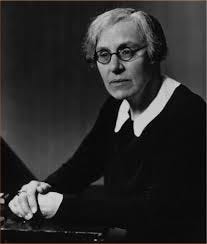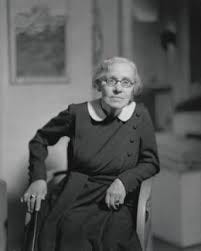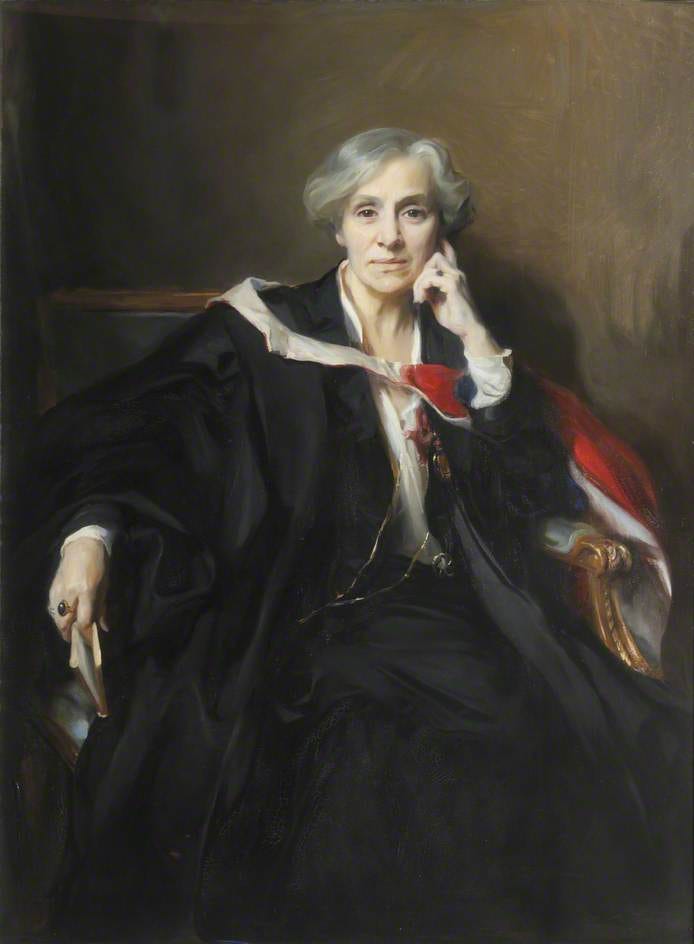[I’ve been correcting proofs for my forthcoming book Suffragist, Peace Crank, and Preacher: The Extraordinary Life and Message of Maude Royden. The book is an anthology of her writings on war and peace, women’s rights, including the right to ordination, theology, ethics, and Church polity. In addition to compiling the selections, I wrote a long Introduction exploring her life, times, and influence.
I’m sharing here one of the book’s chapters, complete with my italicized preface to it. I think it goes a long way to showing that Royden, who died in 1956, still speaks to us today. I’m so happy to reintroduce this incredible person to the world, just as I was to introduce in earlier books two other forgotten greats of the 20th century’s early years: G.A. “Woodbine Willie” Studdert Kennedy and H.R.L. “Dick” Sheppard.]
In this sermon, Royden points out that although we sometimes believe and hope that we can control God through our petitions and prayers—that God, as she says, is “capricious”—none of us really would find such a deity desirable. At least in our better moments, we know that God’s unchangeableness is a blessing, because God is love. That love was incarnated in Jesus Christ who, through his life and teachings, supersedes the Ten Commandments, “dead things” that “condemn our failure.” The Law of Love endows us with creative and salvific power.
The saints have believed in the trustworthiness of God, “with whom is no variableness, neither shadow cast by turning” (Jas 1:17); the world has never believed it. Only now and then have men caught a glimpse of the great truth that God is changeless and that His changelessness is our peace.
For the most part we have both believed and hoped that God might be capricious. We know of no man so good that we should wish him never in any particular to change, and, making God in our own image, we hope that, God though He be, we shall persuade Him—as a sincere and eloquent pleader might persuade one of us—to be a little better, to change His mind. We wish He might be at times more merciful, more full of compassion to us when we think we need it more; or more relentless and less pitiful to our enemies, who, we fear, may be besieging His throne of grace with their impious and unwarrantable petitions at the very hour of our own prayers.
We should, then, find it easy to believe both that God is unchanging and that His unchangingness is not terrible or relentless, but merciful. We should by now be finding it difficult to believe anything else. How could God, who is One, be changeless in a material universe and capricious elsewhere? Why do we still try by prayer to change the mind of God, and, when we fail, speak of “resigning ourselves to His inscrutable will”? Christ taught us not to be “resigned” to the will of God, but actively to carry it out. Even in the Old Testament we are called upon to understand God—“Come now, let us reason together, said the Lord God” (Is 1:18); to stand upon our feet—“Son of man, stand upon thy feet, and I will speak to thee” (Ezek 2:1). How strange that in the twentieth century people should still be found to sing “Thy will be done” as a sort of refrain or chorus to verses containing a list of frightful misfortunes, each of which, it is implied, must be “endured” as coming from the hand of God; when the words used (“Thy will be done”) were uttered by our Lord Himself as a promise that where the will of God is done, there the kingdom of God is established, so as to make a heaven on earth.
Christ appeals to His disciples continually to understand His teaching—not to be resigned to His inscrutable will. He told His hearers that those who failed to live by His teaching were foolish—not that they were wicked.
Where is the law written down that we may learn it and obey it? The Ten Commandments? Surely this is not all! They do not satisfy us, neither do they give us that power over life and over ourselves that we so long for and so worship in Christ. These codes of law, lofty though they may be, solve nothing for us. They are dead things. They do not help in their own fulfillment; they only condemn our failure. “All these have I obeyed from my youth up: what lack I yet?” (Matt 19:20).
We lack Christ. The law is nothing to us until it is lived. The Ten Commandments solve no mystery of life, pain, or perplexity for us. Christ superseded them with a law which is love and of which love is the only fulfillment. He lived this law of Love among men, bore suffering as ourselves; and we beheld His glory, the glory as of the only begotten Son of the Father, full of grace and truth.
Laws are not enough for us. We want a life to show them in action and in power. We want to see the One who proclaims the law live in perfect obedience to that law without once seeking to break, evade, or suspend it; and we want to see that, in fact, what He said was true—that such obedience is power, such service perfect freedom.
We must try to enter into Christ’s mind. We must seek the meaning behind His words. How could we do this unless we had a life to illustrate the law? How could He trust us to do it if He Himself had written a book? We should have sat down to read the book and get the law by rote! Now we must both read the books His followers wrote and try to understand the spirit of the Man of whom they were written.
Christ, the great Master of life, moved among men as a conqueror. For myself, I believe that He both healed the sick and raised the dead, calmed the storm and rose on Easter Sunday from the grave; but even for those to whom these are mere fairy tales there remains the supreme miracle of the life of Christ—the change He made in the hearts of men. In a short life of from thirty to thirty-three or -four years, this man of lowly birth, without wealth or influence or powerful backing, so changed the history of the world that we date now every event in its history by its distance in time from His Coming. “Before or after Christ”—such is the dating of all our records. Christ cut the history of the world in half.
And this He did by no use of force or of wealth; neither the fear of armies nor of magic entered into His appeal. He achieved all by love. The precepts of conduct which, in cold words, sound either fantastic or unmanly, He made real and glorious by His own life. He gave to all who asked and He lacked nothing. He met hatred with love and unbelief with an authority which owed nothing to astonishing feats of magic. He never defended Himself, and we see in Him the bravest of the brave. He took the sword out of the hand of His friend and went like a lamb to the slaughter, and we cry in admiration, “Behold the Man!” (John 19:5).
It is useless to argue that Christ’s laws can never be carried out, for He carried them out Himself; to protest that they are inconsistent with themselves, for the utter consistency of Christ silences the protest on our lips; useless to complain that they are unmanly, for no man ever was so gloriously and perfectly a Man.
It is only when we see how patience and courtesy and “nonresistance” look in Jesus Christ that we realize how empty is the mere commandment—how powerless without the living Example. This only deepens for us our knowledge and belief in Christ’s assurance that God is Love. To turn the other cheek! To endure all things, to believe all things— how pitiful it sounds in the ears of the noble, sagacious, and courageous pagan! But when he sees all these in Christ, can he despise them any more? They may seem too high for him—they cannot seem too low for him. They may be set aside as too hard—they can never again be utterly despised. And so it happens that nearly all men have loved Jesus, though not all worship Him. If God is Love, it is more important to love than to believe, for it is only love which has power to create us in its own image. God is Love.
Here, again, life is based on universal, immutable law. Not Eloi alone, four thousand and four years before Christ, created man in his own image, but Love (which is God) always and everywhere does this. We become, by irresistible compelling, like what we love. This is true of the least as of the greatest. So, loving Christ, we learn to live as He lived and to obey the laws which He obeyed. Law is no longer a dead and empty thing, serving only to condemn us for our failure to keep it: it is a loving power, enabling us to obey.
Thus Christ was the Word of God, creative and creating in God’s image according to His words. “And the Word was made flesh, and dwelt among us (and we beheld His glory, the glory as of the only begotten Son of the Father), full of grace and truth” (John 1:14).
Source
A. Maude Royden, “The Trustworthiness of God,” in The World’s Great Sermons, ed. S. E. Frost Jr. (Garden City, NY: Garden City Publishing, 1942), 310–12.











